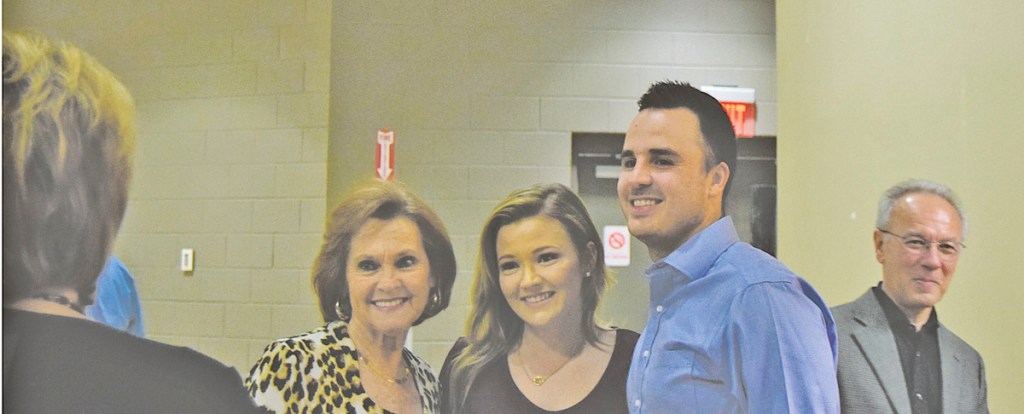The community wins blessed with comprehensive healthcare
Published 8:33 pm Sunday, November 24, 2019

- Gail Broussard Boudreaux, left facing camera, attended the Healthcare Heroes to celebrate the nomination and award won by her granddaughter, Lacey Blanchard Martinez. Lacey’s husband, Nathan ‘J.J.’ Jason Martinez, was nominated in the same category, occupational therapist. Dr. Paul Gulotta Jr., right, also won for Best Cardiologist.
DUE TO TECHNICAL PROBLEMS, OTHER PHOTOS
AT THIS EVENT WILL BE UPLOADED NEXT WEEK
People who are blessed with family members or friends in the healthcare industry these days are the fortunate ones. The inside track for good care, potential treatments and comforting clarification after a doctor’s diagnosis are just some of the advantages they have over others who face the field without discernment or recommendations. The practicing part of medicine is a daily occurance regardless of the number of years a doctor or technician has been licensed. Changes in causes, treatments, medications, insurance and payment options keep most people guessing if they are getting the best treatment at the best price.
For only the second year, The Daily Iberian has sought out the industry’s brightest and best to say “Thank you,” and to give family, friends and collegues the opportunity to say the same, plus “well done.” Thursday at the Cade Community Center, the winners in 69 healthcare categories were announced. The full list is available in today’s special Healthcare Heroes supplement, a good reference the next time someone close needs a provider recommendation.
Healthcare is not just about treatment when a diagnosis is evident. It includes good nutrition, exercise, mental health and all the support services necessary to keep the human body functioning to its highest level, for as long as possible. Many people think first of the physician, or primary care such as dentists, when medical services are mentioned. These awards also recognize the workers whose efficiency, customer service and experience in the field can mean the difference between life or death. As an example, if a recent change in doctors brings a new perscription, the patient may have forgotten to mention an old medication or sometimes used one that has a direct interactive side effect that can have adverse reactions. A knowledgeable pharmacist knows everything that the patient is taking and can be alerted before dispensing the medicine.
Therapists, occupational or physical, are often prescribed following a major procedure or accident. Listening and doing what the “doctor ordered” can make the difference between complete and partial recovery.
The moment a person is diagnosed with a disease or illness brings life-changing events for both patients and their families. Thanks to the tireless efforts of medical researchers, many conditions, including diseases like cancer, are now routinely discovered in their earliest stages, which greatly improves patients’ prognoses.
While medical care typically focuses on treating and curing a disease or illness, sometimes patient care focuses on improving quality of life. Such care is known as palliative care.
According to the Center to Advance Palliative Care, palliative care teams treat people suffering from the symptoms and stress of serious illnesses. Such illnesses may include cancer, congestive heart failure, chronic obstructive pulmonary disease, Alzheimer’s disease and Parkinson’s disease, among others.
Alleviating suffering is the goal of palliative care. People with serious illnesses often deal with symptoms such as pain, depression, fatigue and anxiety, and palliative care teams try to help them overcome these symptoms so they can enjoy a better quality of life. Such care has been shown to have remarkable effects. In fact, the CAPC notes that a recent study published in the New England Journal of Medicine found that patients with a serious illness who received palliative care lived longer than patients who received no such care.
Palliative care teams are made up of specialists who can tend to an assortment of patients’ needs, including their physical, psychological and social needs. A palliative care team may include doctors, nurses and other healthcare specialists. The CAPC notes that palliative care teams routinely communicate with patients’ physicians so everyone is on the same page.
Palliative care can be invaluable to people diagnosed with serious illnesses. Patients and their family members can discuss palliative care with their physicians and their healthcare providers. Learn more about palliative care at www.getpalliativecare.org.





